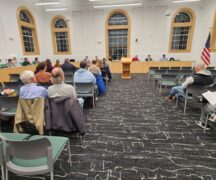The raging wildfires out West, the devastation of Hurricane Ida. The sight of red skies and ashes, of flooded streets and abandoned homes. News stories of terrified families and lost love ones. The shocking extreme weather of late comes as no surprise to scientists who warned for decades that we are heading toward climate catastrophe.
“These extremes are something we knew were coming,” climate scientist Katharine Hayhoe recently told the Washington Post. “The suffering that is here and now is because we have not heeded the warnings sufficiently.”
The warnings go back to 1988 when then-NASA scientist Dr. James Hansen described to Congress how carbon dioxide from burning fossil fuels was trapping heat in our atmosphere.
Thirty-three years on, 2021 is providing an unwelcome glimpse of the hellish future that awaits if the world fails to take decisive action to drastically reduce the greenhouse gas emissions driving climate change.
A warming climate has contributed to supercharged conditions in the Gulf of Mexico with unusually warm seawater temperatures helping power Hurricane Ida inland on its path of destruction in Louisiana. As multiple states continue to clean up after Ida, the number of deaths linked to the hurricane and resulting tropical storm has surpassed 60.
This weather disaster is the latest in a rapid succession of climate change-fueled weather events across the U.S, including deadly inland flooding in the South, unprecedented wildfires in the West, and record precipitation in the Northeast. When incidents occur back-to-back, cities and states do not have time to recover, putting them even more at risk.
Here in Bowling Green, we too have experienced climate-related hardships. Who can forget the sight of the flooded-out cornfields from the last few years? Local farmers have to work hard to repair or replace overwhelmed drainage systems, and local homeowners have to live with increased risk of mold, flooded foundations, and damage to their hard-earned homes.
The cumulative effect of these weather-related disasters sends a clear message: Time is up to address climate change.
Signs of hope emerged recently as the budget reconciliation process continues in Congress. The budget blueprint contains measures to reduce greenhouse gas emissions with the aim of cutting those emissions in half within 10 years. In early September, news broke that the Senate Finance Committee is considering carbon pricing with “a potential tax on the carbon content of fossil fuels starting at $15 per ton,” as part of the budget package.
Bloomberg reported committee members were discussing a carbon tax with “rebates for low-income taxpayers and a border-adjustment tax aimed at ensuring foreign companies don’t get an advantage.”
A robust price on carbon has bipartisan appeal and would ensure President Biden meets his goal of reducing carbon emissions in the U.S. by 50% by 2030. Previously, policy modeling outlined by Majority Leader Schumer fell short of that target by 5%.
To ensure that the indispensable tool of carbon pricing is included in upcoming legislation, we ask Sens. Rob Portman and Sherrod Brown, and Congressman Robert Latta to support a price on carbon as part of the budget reconciliation negotiations.
Recent extreme weather disasters underscore that we are running out of time to address climate change. Congress needs to go big on solutions, or we will all suffer the future consequences.
Charlotte Reith, a volunteer with the Bowling Green chapter of Citizens’ Climate Lobby
Mark Reynolds, the executive director of Citizens’ Climate Lobby




